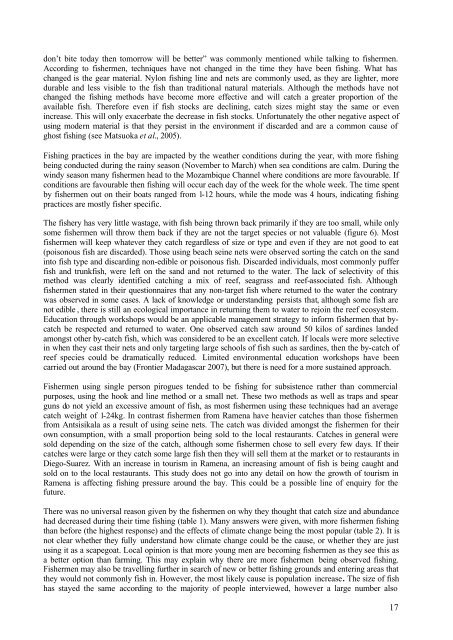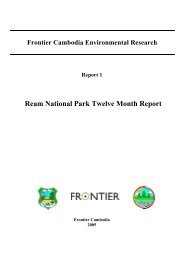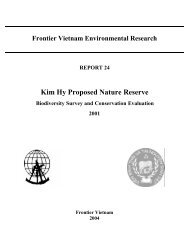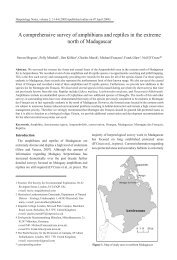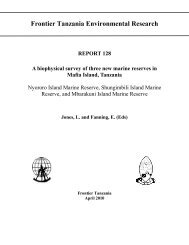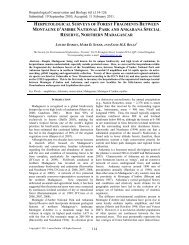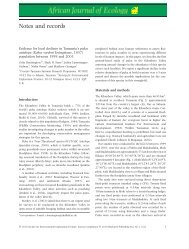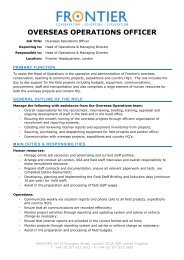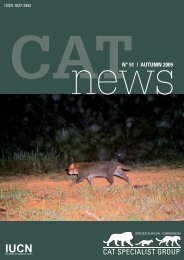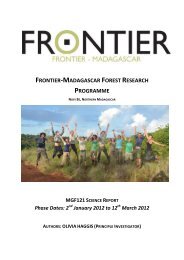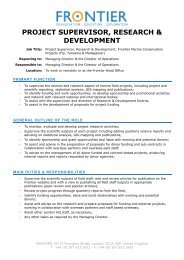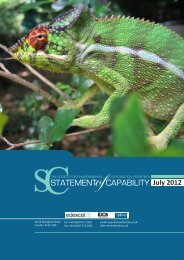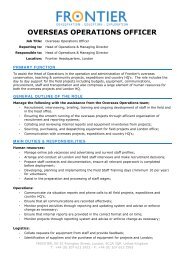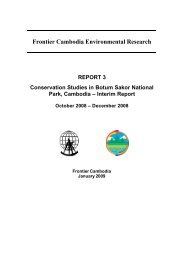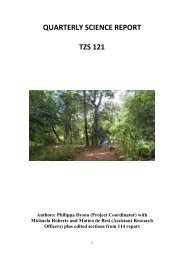An assessment of local fisheries in Diego-Suarez Bay, Madagascar
An assessment of local fisheries in Diego-Suarez Bay, Madagascar
An assessment of local fisheries in Diego-Suarez Bay, Madagascar
Create successful ePaper yourself
Turn your PDF publications into a flip-book with our unique Google optimized e-Paper software.
don’t bite today then tomorrow will be better” was commonly mentioned while talk<strong>in</strong>g to fishermen.<br />
Accord<strong>in</strong>g to fishermen, techniques have not changed <strong>in</strong> the time they have been fish<strong>in</strong>g. What has<br />
changed is the gear material. Nylon fish<strong>in</strong>g l<strong>in</strong>e and nets are commonly used, as they are lighter, more<br />
durable and less visible to the fish than traditional natural materials. Although the methods have not<br />
changed the fish<strong>in</strong>g methods have become more effective and will catch a greater proportion <strong>of</strong> the<br />
available fish. Therefore even if fish stocks are decl<strong>in</strong><strong>in</strong>g, catch sizes might stay the same or even<br />
<strong>in</strong>crease. This will only exacerbate the decrease <strong>in</strong> fish stocks. Unfortunately the other negative aspect <strong>of</strong><br />
us<strong>in</strong>g modern material is that they persist <strong>in</strong> the environment if discarded and are a common cause <strong>of</strong><br />
ghost fish<strong>in</strong>g (see Matsuoka et al., 2005).<br />
Fish<strong>in</strong>g practices <strong>in</strong> the bay are impacted by the weather conditions dur<strong>in</strong>g the year, with more fish<strong>in</strong>g<br />
be<strong>in</strong>g conducted dur<strong>in</strong>g the ra<strong>in</strong>y season (November to March) when sea conditions are calm. Dur<strong>in</strong>g the<br />
w<strong>in</strong>dy season many fishermen head to the Mozambique Channel where conditions are more favourable. If<br />
conditions are favourable then fish<strong>in</strong>g will occur each day <strong>of</strong> the week for the whole week. The time spent<br />
by fishermen out on their boats ranged from 1-12 hours, while the mode was 4 hours, <strong>in</strong>dicat<strong>in</strong>g fish<strong>in</strong>g<br />
practices are mostly fisher specific.<br />
The fishery has very little wastage, with fish be<strong>in</strong>g thrown back primarily if they are too small, while only<br />
some fishermen will throw them back if they are not the target species or not valuable (figure 6). Most<br />
fishermen will keep whatever they catch regardless <strong>of</strong> size or type and even if they are not good to eat<br />
(poisonous fish are discarded). Those us<strong>in</strong>g beach se<strong>in</strong>e nets were observed sort<strong>in</strong>g the catch on the sand<br />
<strong>in</strong>to fish type and discard<strong>in</strong>g non-edible or poisonous fish. Discarded <strong>in</strong>dividuals, most commonly puffer<br />
fish and trunkfish, were left on the sand and not returned to the water. The lack <strong>of</strong> selectivity <strong>of</strong> this<br />
method was clearly identified catch<strong>in</strong>g a mix <strong>of</strong> reef, seagrass and reef-associated fish. Although<br />
fishermen stated <strong>in</strong> their questionnaires that any non-target fish where returned to the water the contrary<br />
was observed <strong>in</strong> some cases. A lack <strong>of</strong> knowledge or understand<strong>in</strong>g persists that, although some fish are<br />
not edible , there is still an ecological importance <strong>in</strong> return<strong>in</strong>g them to water to rejo<strong>in</strong> the reef ecosystem.<br />
Education through workshops would be an applicable management strategy to <strong>in</strong>form fishermen that bycatch<br />
be respected and returned to water. One observed catch saw around 50 kilos <strong>of</strong> sard<strong>in</strong>es landed<br />
amongst other by-catch fish, which was considered to be an excellent catch. If <strong>local</strong>s were more selective<br />
<strong>in</strong> when they cast their nets and only target<strong>in</strong>g large schools <strong>of</strong> fish such as sard<strong>in</strong>es, then the by-catch <strong>of</strong><br />
reef species could be dramatically reduced. Limited environmental education workshops have been<br />
carried out around the bay (Frontier <strong>Madagascar</strong> 2007), but there is need for a more susta<strong>in</strong>ed approach.<br />
Fishermen us<strong>in</strong>g s<strong>in</strong>gle person pirogues tended to be fish<strong>in</strong>g for subsistence rather than commercial<br />
purposes, us<strong>in</strong>g the hook and l<strong>in</strong>e method or a small net. These two methods as well as traps and spear<br />
guns do not yield an excessive amount <strong>of</strong> fish, as most fishermen us<strong>in</strong>g these techniques had an average<br />
catch weight <strong>of</strong> 1-24kg. In contrast fishermen from Ramena have heavier catches than those fishermen<br />
from <strong>An</strong>tsisikala as a result <strong>of</strong> us<strong>in</strong>g se<strong>in</strong>e nets. The catch was divided amongst the fishermen for their<br />
own consumption, with a small proportion be<strong>in</strong>g sold to the <strong>local</strong> restaurants. Catches <strong>in</strong> general were<br />
sold depend<strong>in</strong>g on the size <strong>of</strong> the catch, although some fishermen chose to sell every few days. If their<br />
catches were large or they catch some large fish then they will sell them at the market or to restaurants <strong>in</strong><br />
<strong>Diego</strong>-<strong>Suarez</strong>. With an <strong>in</strong>crease <strong>in</strong> tourism <strong>in</strong> Ramena, an <strong>in</strong>creas<strong>in</strong>g amount <strong>of</strong> fish is be<strong>in</strong>g caught and<br />
sold on to the <strong>local</strong> restaurants. This study does not go <strong>in</strong>to any detail on how the growth <strong>of</strong> tourism <strong>in</strong><br />
Ramena is affect<strong>in</strong>g fish<strong>in</strong>g pressure around the bay. This could be a possible l<strong>in</strong>e <strong>of</strong> enquiry for the<br />
future.<br />
There was no universal reason given by the fishermen on why they thought that catch size and abundance<br />
had decreased dur<strong>in</strong>g their time fish<strong>in</strong>g (table 1). Many answers were given, with more fishermen fish<strong>in</strong>g<br />
than before (the highest response) and the effects <strong>of</strong> climate change be<strong>in</strong>g the most popular (table 2). It is<br />
not clear whether they fully understand how climate change could be the cause, or whether they are just<br />
us<strong>in</strong>g it as a scapegoat. Local op<strong>in</strong>ion is that more young men are becom<strong>in</strong>g fishermen as they see this as<br />
a better option than farm<strong>in</strong>g. This may expla<strong>in</strong> why there are more fishermen be<strong>in</strong>g observed fish<strong>in</strong>g.<br />
Fishermen may also be travell<strong>in</strong>g further <strong>in</strong> search <strong>of</strong> new or better fish<strong>in</strong>g grounds and enter<strong>in</strong>g areas that<br />
they would not commonly fish <strong>in</strong>. However, the most likely cause is population <strong>in</strong>crease. The size <strong>of</strong> fish<br />
has stayed the same accord<strong>in</strong>g to the majority <strong>of</strong> people <strong>in</strong>terviewed, however a large number also<br />
17


